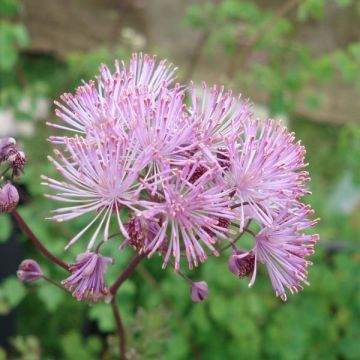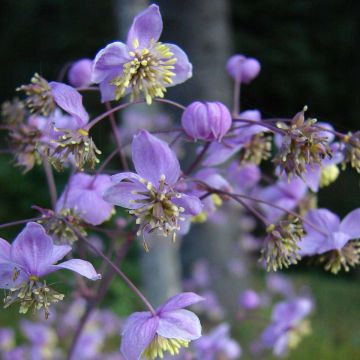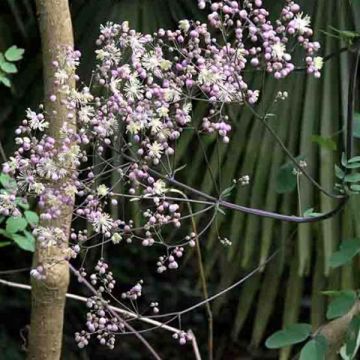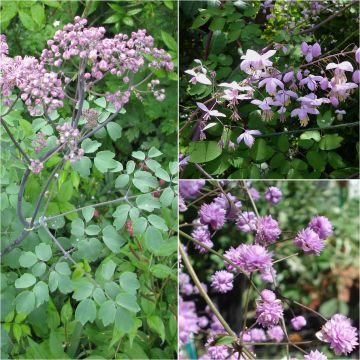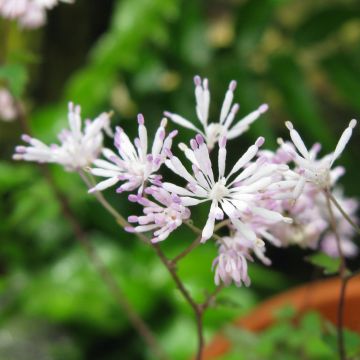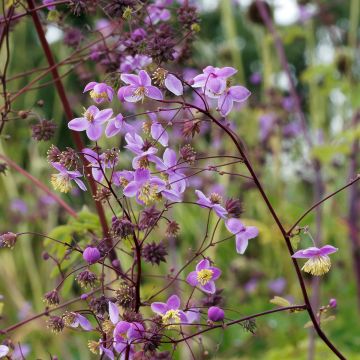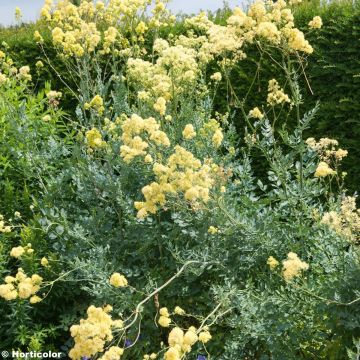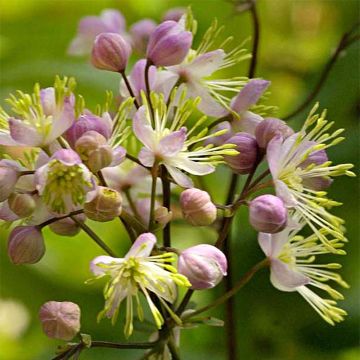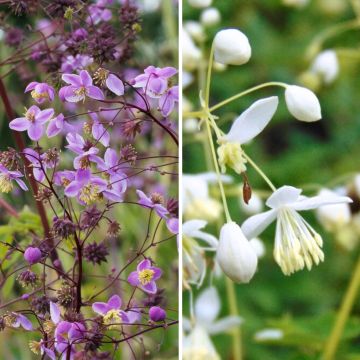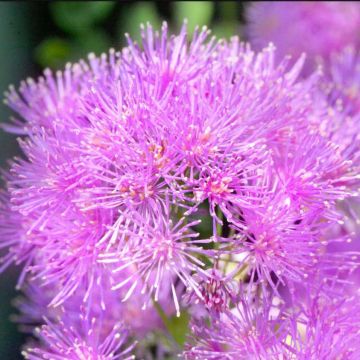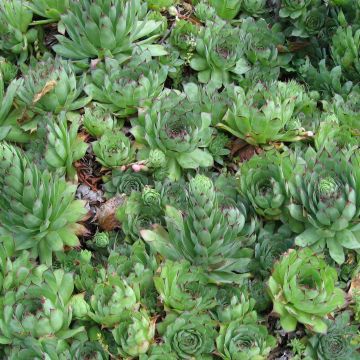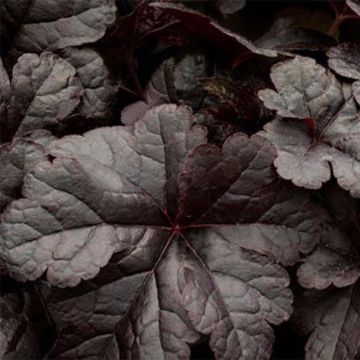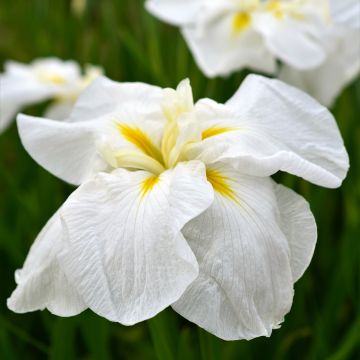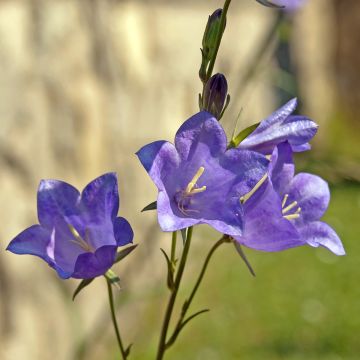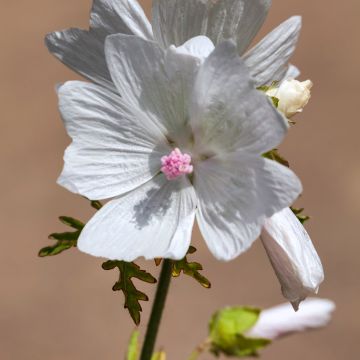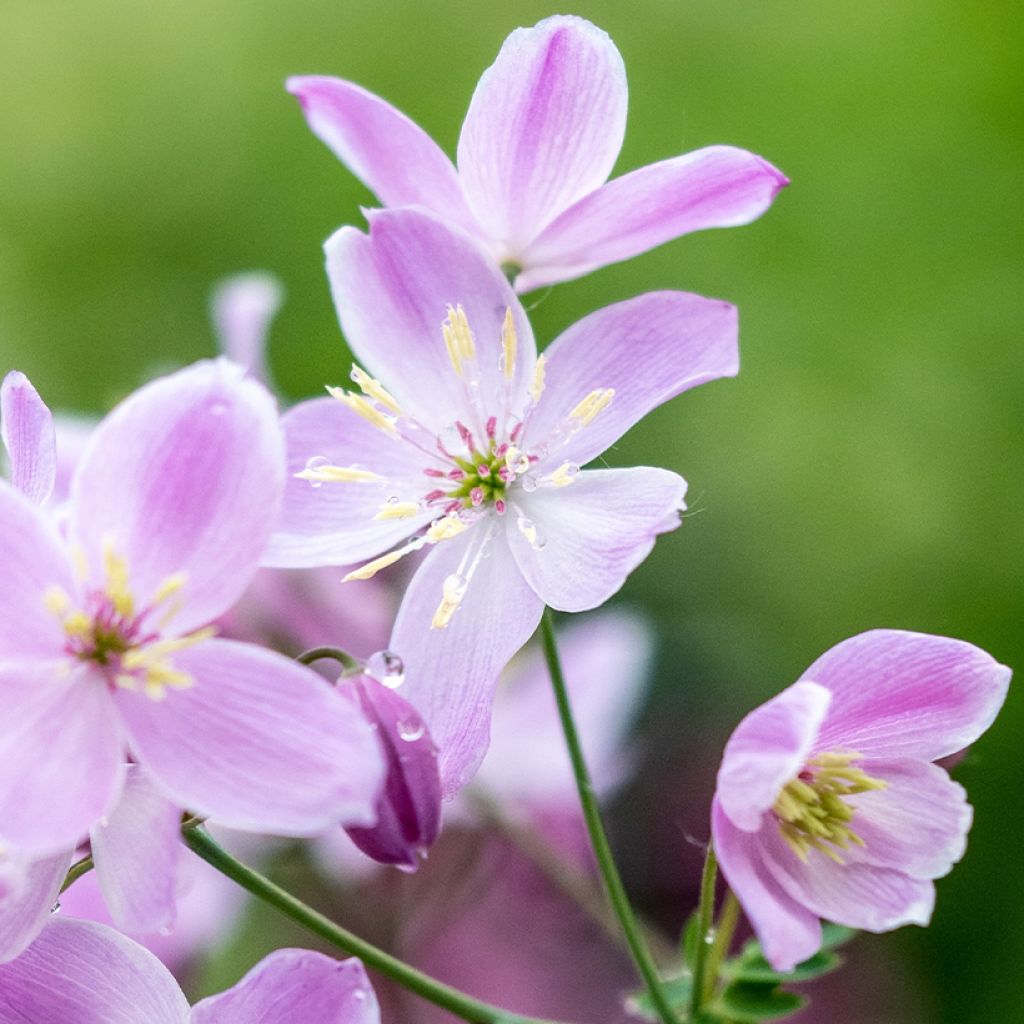

Thalictrum Chantilly Lace - Pigamon
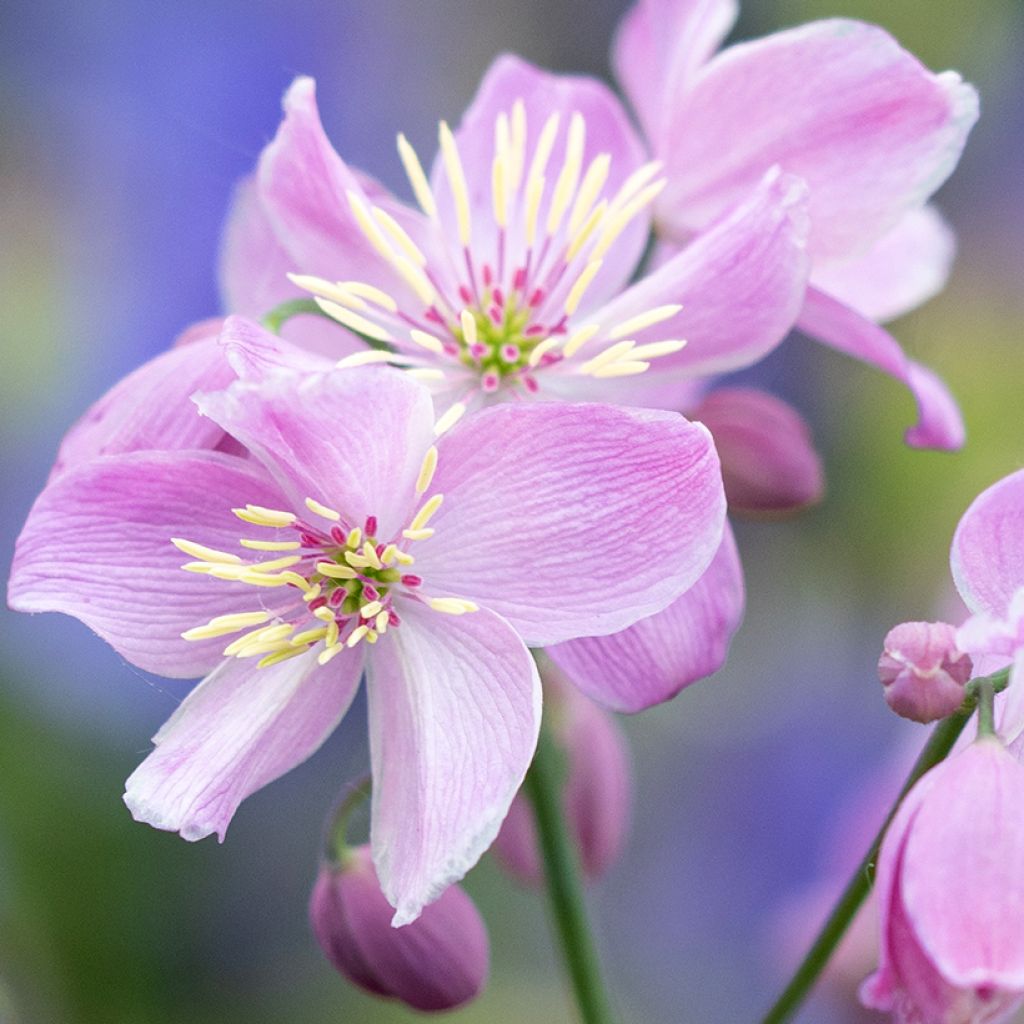

Thalictrum Chantilly Lace - Pigamon
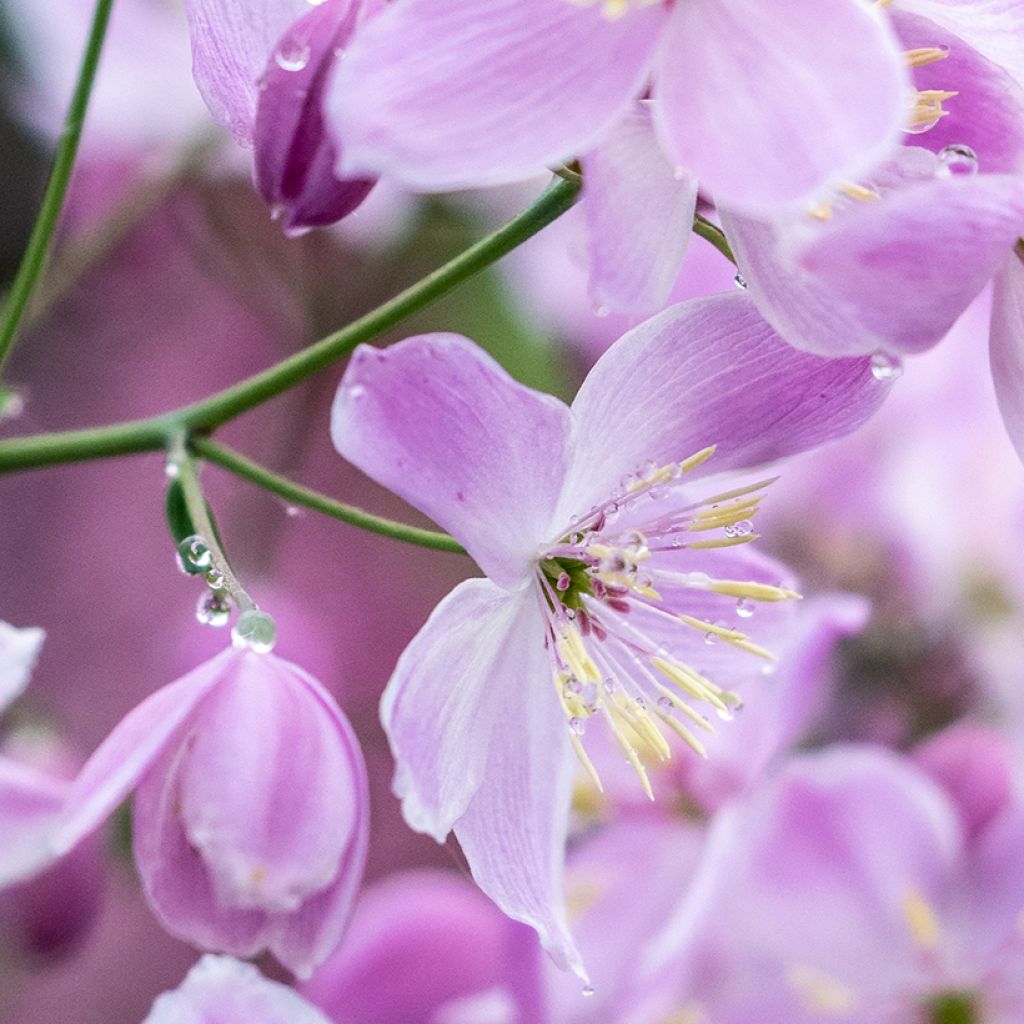

Thalictrum Chantilly Lace - Pigamon
Thalictrum Chantilly Lace - Meadow-rue
Thalictrum Chantilly Lace
Meadow Rue
Why not try an alternative variety in stock?
View all →This plant carries a 12 months recovery warranty
More information
We guarantee the quality of our plants for a full growing cycle, and will replace at our expense any plant that fails to recover under normal climatic and planting conditions.
From €5.90 for pickup delivery and €6.90 for home delivery
Express home delivery from €8.90.
Does this plant fit my garden?
Set up your Plantfit profile →
Description
Thalictrum Chantilly Lace is a variety of Meadow-rue which is compact with many summer flowers in a beautiful mauve-pink to purple-pink shade. This lovely shade-loving perennial develops crowned floral stems with large inflorescences composed of small flowers in cups, open on pale lime-green stamens. The medium green finely cut foliage, which strongly resembles that of columbines, is attractive and contributes to the delicacy and grace of the plant. An ideal plant to lighten up semi-shaded borders, in humus-rich and moist soil.
Thalictrum Chantilly Lace is a horticultural creation from 2020 by the English nursery 'Hardy's Cottage Garden Plants'. Its wild ancestor, the columbine-leaved meadow-rue, is native to damp and shaded mountain meadows in Europe and Asia. It belongs to the buttercup family, just like anemones, clematis, and... columbines. This tall herbaceous perennial with a rhizomatous base can sometimes take time to establish, but its beauty is worth the wait. The Chantilly Lace variety stands out for its lower habit and its beautiful purple-pink flowers. When mature, the plant reaches about 35 cm (14in) in all directions. Its medium green leaves with undulate edges are divided into obovate leaflets on either side of the central vein. The foliage is very similar to garden columbines. Appearing in June-July, the flowers are arranged in large paniculate clusters forming clouds of single cup-shaped flowers. They are composed of violet petals with long radiating stamens. The stems that bear them are strong enough to not be staked. The above-ground vegetation, deciduous, dries up in autumn and regrows in spring.
It is in the border or middle of the flower bed that this beautiful Chantilly Lace meadow-rue finds its place. Its flowering stems are perfect for making summer bouquets, with roses or peonies for example. It thrives in lightly sunny or semi-shaded areas of the garden. A damp and deep soil allows it to grow vigorously, but it also tolerates summer heat, as long as it is watered from time to time at the end of the day. It pairs very well with lilies, as well as with ferns, hostas, bellflowers, meadowsweets, rodgersias, and perennial geraniums.
Report an error about the product description
Flowering
Foliage
Plant habit
Botanical data
Thalictrum
Chantilly Lace
Ranunculaceae
Meadow Rue
Cultivar or hybrid
Other Thalictrum - Meadow Rue
Planting and care
Thalictrum Chantilly Lace can be planted in spring or autumn, in partial shade, in soil rich in humus or compost, deep and moist, but well-drained. Water during dry weather and spread mulch on the soil to maintain moisture in summer. Do not prune the young plants to the ground after flowering, as new shoots will only emerge in late spring. Remove faded flowers to prevent excessive self-seeding. Perfectly hardy, Thalictrum can withstand temperatures as low as -21°C (-5.8°F). Generally very robust, it may be susceptible to powdery mildew in hot and dry weather. Gastropods sometimes cause some damage in spring.
Planting period
Intended location
Care
This item has not been reviewed yet - be the first to leave a review about it.
Summer flowering perennials
Haven't found what you were looking for?
Hardiness is the lowest winter temperature a plant can endure without suffering serious damage or even dying. However, hardiness is affected by location (a sheltered area, such as a patio), protection (winter cover) and soil type (hardiness is improved by well-drained soil).

Photo Sharing Terms & Conditions
In order to encourage gardeners to interact and share their experiences, Promesse de fleurs offers various media enabling content to be uploaded onto its Site - in particular via the ‘Photo sharing’ module.
The User agrees to refrain from:
- Posting any content that is illegal, prejudicial, insulting, racist, inciteful to hatred, revisionist, contrary to public decency, that infringes on privacy or on the privacy rights of third parties, in particular the publicity rights of persons and goods, intellectual property rights, or the right to privacy.
- Submitting content on behalf of a third party;
- Impersonate the identity of a third party and/or publish any personal information about a third party;
In general, the User undertakes to refrain from any unethical behaviour.
All Content (in particular text, comments, files, images, photos, videos, creative works, etc.), which may be subject to property or intellectual property rights, image or other private rights, shall remain the property of the User, subject to the limited rights granted by the terms of the licence granted by Promesse de fleurs as stated below. Users are at liberty to publish or not to publish such Content on the Site, notably via the ‘Photo Sharing’ facility, and accept that this Content shall be made public and freely accessible, notably on the Internet.
Users further acknowledge, undertake to have ,and guarantee that they hold all necessary rights and permissions to publish such material on the Site, in particular with regard to the legislation in force pertaining to any privacy, property, intellectual property, image, or contractual rights, or rights of any other nature. By publishing such Content on the Site, Users acknowledge accepting full liability as publishers of the Content within the meaning of the law, and grant Promesse de fleurs, free of charge, an inclusive, worldwide licence for the said Content for the entire duration of its publication, including all reproduction, representation, up/downloading, displaying, performing, transmission, and storage rights.
Users also grant permission for their name to be linked to the Content and accept that this link may not always be made available.
By engaging in posting material, Users consent to their Content becoming automatically accessible on the Internet, in particular on other sites and/or blogs and/or web pages of the Promesse de fleurs site, including in particular social pages and the Promesse de fleurs catalogue.
Users may secure the removal of entrusted content free of charge by issuing a simple request via our contact form.
The flowering period indicated on our website applies to countries and regions located in USDA zone 8 (France, the United Kingdom, Ireland, the Netherlands, etc.)
It will vary according to where you live:
- In zones 9 to 10 (Italy, Spain, Greece, etc.), flowering will occur about 2 to 4 weeks earlier.
- In zones 6 to 7 (Germany, Poland, Slovenia, and lower mountainous regions), flowering will be delayed by 2 to 3 weeks.
- In zone 5 (Central Europe, Scandinavia), blooming will be delayed by 3 to 5 weeks.
In temperate climates, pruning of spring-flowering shrubs (forsythia, spireas, etc.) should be done just after flowering.
Pruning of summer-flowering shrubs (Indian Lilac, Perovskia, etc.) can be done in winter or spring.
In cold regions as well as with frost-sensitive plants, avoid pruning too early when severe frosts may still occur.
The planting period indicated on our website applies to countries and regions located in USDA zone 8 (France, United Kingdom, Ireland, Netherlands).
It will vary according to where you live:
- In Mediterranean zones (Marseille, Madrid, Milan, etc.), autumn and winter are the best planting periods.
- In continental zones (Strasbourg, Munich, Vienna, etc.), delay planting by 2 to 3 weeks in spring and bring it forward by 2 to 4 weeks in autumn.
- In mountainous regions (the Alps, Pyrenees, Carpathians, etc.), it is best to plant in late spring (May-June) or late summer (August-September).
The harvesting period indicated on our website applies to countries and regions in USDA zone 8 (France, England, Ireland, the Netherlands).
In colder areas (Scandinavia, Poland, Austria...) fruit and vegetable harvests are likely to be delayed by 3-4 weeks.
In warmer areas (Italy, Spain, Greece, etc.), harvesting will probably take place earlier, depending on weather conditions.
The sowing periods indicated on our website apply to countries and regions within USDA Zone 8 (France, UK, Ireland, Netherlands).
In colder areas (Scandinavia, Poland, Austria...), delay any outdoor sowing by 3-4 weeks, or sow under glass.
In warmer climes (Italy, Spain, Greece, etc.), bring outdoor sowing forward by a few weeks.

































